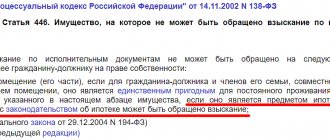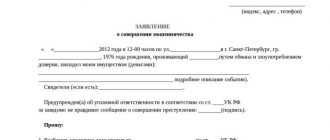Commentary to Art. 278 Civil Code of the Russian Federation
1. As a general rule, the procedure for foreclosure on property for the owner’s obligations is determined by law or agreement (clause 1 of Article 237 of the Civil Code) and is carried out according to an executive document - a judicial act, a notary’s writ of execution or a writ of execution (clause 1 of Article 78 of the Law on enforcement proceedings). In contrast, foreclosure on a land plot is carried out only by court decision. Extrajudicial foreclosure of a land plot is not permitted.
2. In accordance with Art. 69 of the Law on Enforcement Proceedings, foreclosure on the debtor’s property includes the seizure of property and its forced sale or transfer to the claimant. Foreclosure of property is carried out in the amount of debt, taking into account expenses arising in the process of execution. Execution cannot be made on land plots withdrawn from circulation, as well as plots on which residential premises are located, which are the only premises suitable for permanent residence for debtor citizens and members of their families, except if the land plot with residential premises located on it the premises are the subject of a mortgage and can be foreclosed on in accordance with the legislation on mortgages (clause 1 of Article 446 of the Code of Civil Procedure). Execution is applied to the owner's land plot, regardless of where and in whose actual possession or use it is located.
3. Foreclosure is possible not only on the land plot itself, but also on the right to long-term lease (Clause 1, Article 75 of the Law on Enforcement Proceedings). When foreclosure is applied to the right to lease a land plot pledged under a mortgage agreement and when it is sold, the obligations of the tenant under the relevant lease agreement are also transferred to the person who acquired such a right (clause 6 of the Supreme Arbitration Court letter No. 90).
4. In accordance with Art. 68 of the Law on Mortgage, a land plot acquired during sale at a public auction, auction or competition is subject to requirements for permitted use, restrictions on the circle of persons who can purchase such plots, and a change in its purpose is possible only in cases provided for by land legislation. It is not allowed to foreclose on a mortgaged land plot from agricultural land before the expiration of the corresponding period of agricultural work, taking into account the time required for the sale of produced or produced and processed agricultural products. The foreclosure by the mortgagee on the mortgaged land plot and its sale are grounds for termination of the right to use it by the mortgagor and any other persons owning such land plot.
5. The ownership right to the land plot that is foreclosed on is terminated from the owner from the moment the ownership right to the seized plot arises from its acquirer (clause 2 of Article 237 of the Civil Code).
Judicial practice under Article 278 of the Civil Code of the Russian Federation
Ruling of the Supreme Court of the Russian Federation dated January 13, 2020 N 306-ES19-24662 in case N A65-15224/2018
When considering the dispute, the courts were guided by Articles 237, 278, 353, 460 of the Civil Code of the Russian Federation, Articles 68, 69, 87, 94 of the Federal Law dated 02.10.2007 N 229-FZ “On Enforcement Proceedings” and proceeded from the fact that the company, being the owner of the specified property, has a debt to the company on the basis of a court decision that has entered into legal force; the possibility of selling property is directly related to foreclosure on it only on the basis of a court decision; This claim was filed before the date of introduction of the surveillance procedure against the company.
Article 278. Forcible seizure of power or forcible retention of power
Appeal ruling of the Supreme Court of the Russian Federation dated July 12, 2017 N 205-APU17-21 According to the note to Art. 205.3 of the Criminal Code of the Russian Federation, a person who has committed a crime under Art. 205.3 of the Criminal Code of the Russian Federation, is exempt from criminal liability if it informed the authorities about the completion of training, knowingly for the student, conducted for the purpose of carrying out terrorist activities or committing one of the crimes provided for in Art. Art. 205.1, 206, 208, 211, 277, 278, 279, 360 and 361 of the Criminal Code of the Russian Federation, contributed to the disclosure of the crime committed or the identification of other persons who underwent such training, carried out, organized or financed such training, as well as the places where it was carried out and if in it actions do not contain any other corpus delicti.
Resolution of the Presidium of the Supreme Court of the Russian Federation dated March 6, 2019 N 186-P18
Chernova Natalya Yurievna, ... was detained on December 14, 2004 in accordance with Art. Art. 91, 92 of the Code of Criminal Procedure of the Russian Federation on suspicion of committing crimes under Part 2 of Art. 167, art. 214, art. 278 of the Criminal Code of the Russian Federation. By the decision of the judge of the Khamovnichesky District Court of Moscow dated December 17, 2004, Chernova N.Yu. a preventive measure in the form of detention was chosen.
Appeal ruling of the Judicial Collegium for Military Personnel Cases of the Supreme Court of the Russian Federation dated June 27, 2019 N 201-APU19-18
Thus, participation in the activities of a terrorist organization is understood as the commission by a person of deliberate actions related to the continuation or resumption of the activities of this organization, and participation in a terrorist community is understood as the inclusion of a person in a stable group of two or more persons with the intention of participating in terrorist activities or preparation or commission of one or more crimes provided for in Articles 205.1, 205.2, 206, 208, 211, 220, 221, 277, 278, 279, 360 and 361 of the Criminal Code of the Russian Federation, or other crimes for the purpose of promoting, justifying and supporting terrorism, including Art. 205.5 of the Criminal Code of the Russian Federation is not specified, as well as participation in the preparation for or in the commission of such crimes, as well as the performance by a person of functional duties to ensure the activities of such a community. When a participant in a terrorist organization commits a specific crime, his actions are subject to qualification according to the totality of crimes provided for in Part 2 of Art. 205.5 of the Criminal Code of the Russian Federation and the corresponding article of the Special Part of the Criminal Code of the Russian Federation, which was established in this criminal case.
Appeal ruling of the Judicial Collegium for Military Personnel Cases of the Supreme Court of the Russian Federation dated July 23, 2019 N 201-APU19-25
Rakhmonkhodzhaev Zikrullokhon Faizullokhodzhaevich, ... convicted by the verdict of the Moscow City Court dated July 30, 2014 (taking into account the changes made by the appeal ruling of the Judicial Collegium for Criminal Cases of the Supreme Court of the Russian Federation dated December 11, 2014) for committing crimes under Part 1 of Art. . , art. 278 and part 1 of Art. 222 of the Criminal Code of the Russian Federation, to 7 years of imprisonment in a maximum security correctional colony (the term of serving the sentence was decided to be calculated from November 7, 2012),
Appeal ruling of the Judicial Collegium for Military Personnel Cases of the Supreme Court of the Russian Federation dated 09/03/2019 N 205-APU19-27
Within the meaning of Art. 205.1 of the Criminal Code of the Russian Federation, the financing of terrorism should be recognized, along with the provision of financial services, the provision or collection of not only money, but also material resources with the understanding that they are intended to finance the organization, preparation or commission of at least one of the crimes provided for in Articles 205, 205.1, 205.2, 205.3, 205.4, 205.5, 206, 208, 211, 220, 221, 277, 278, 279 and 360 of the Criminal Code of the Russian Federation, or for financing or other material support of a person for the purpose of committing at least one of these crimes, or to support an organized group, illegal armed group, criminal community (criminal organization) created or being created to commit at least one of these crimes.
Appeal ruling of the Judicial Collegium for Military Personnel Cases of the Supreme Court of the Russian Federation dated September 25, 2019 N 201-APU19-44
Within the meaning of Art. 205.1 of the Criminal Code of the Russian Federation, the financing of terrorism should be recognized, along with the provision of financial services, the provision or collection of not only money, but also material resources with the understanding that they are intended to finance the organization, preparation or commission of at least one of the crimes provided for in Articles 205, 205.1, 205.2, 205.3, 205.4, 205.5, 206, 208, 211, 220, 221, 277, 278, 279 and 360 of the Criminal Code of the Russian Federation, or for financing or other material support of a person for the purpose of committing at least one of these crimes, or to support an organized group, illegal armed group, criminal community (criminal organization) created or being created to commit at least one of these crimes.
Appeal ruling of the Judicial Collegium for Military Personnel Cases of the Supreme Court of the Russian Federation dated October 22, 2019 N 208-APU19-10
In accordance with Art. 205.1 of the Criminal Code of the Russian Federation, the financing of terrorism should be recognized, along with the provision of financial services, the provision or collection of not only money, but also material resources with the understanding that they are intended to finance the organization, preparation or commission of at least one of the crimes provided for in Articles 205, 205.1, 205.2, 205.3, 205.4, 205.5, 206, 208, 211, 220, 221, 277, 278, 279 and 360 of the Criminal Code of the Russian Federation, or for financing or other material support of a person for the purpose of committing at least one of these crimes, or to support an organized group, illegal armed group, criminal community (criminal organization) created or being created to commit at least one of these crimes.
Appeal ruling of the Judicial Collegium for Criminal Cases of the Supreme Court of the Russian Federation dated October 31, 2019 N 20-APU19-13
convicted on July 11, 2002 by the Stavropol Regional Court under Part 2 of Art. 210, part 2 art. 208, part 1 art. Art. 278, part 3 art. 222 of the Criminal Code of the Russian Federation to 10 years in prison to be served in a maximum security colony,
Determination of the Constitutional Court of the Russian Federation dated November 28, 2019 N 3245-O
According to paragraph 1 of the notes to the said article, public justification of terrorism is understood as a public statement recognizing the ideology and practice of terrorism as correct, in need of support and imitation. Public calls to carry out terrorist activities should be understood as appeals expressed in any form (for example, oral, written, using technical means) to other persons in order to induce them to carry it out, i.e. to commit crimes under Articles 205 - 206, 208, 211, 220, 221, 277, 278, 279, 360 and 361 of the Criminal Code of the Russian Federation. The issue of publicity of calls for terrorist activities or justification of terrorism must be resolved by the courts, taking into account the place, method, situation and other circumstances of the case (appeals to a group of people in public places, at meetings, rallies, demonstrations, distribution of leaflets, hanging posters, dissemination of appeals by mass mailing of messages to mobile subscribers, etc.). Public calls for terrorist activities should be considered a completed crime from the moment of public proclamation (dissemination) of at least one appeal, regardless of whether it was possible to induce other citizens to carry it out or not. Public justification of terrorism constitutes a completed crime from the moment a person makes a public speech in which he declares recognition of the ideology and practice of terrorism as correct and worthy of support and imitation.
Appeal ruling of the Judicial Collegium for Military Personnel Cases of the Supreme Court of the Russian Federation dated December 5, 2019 N 224-APU19-11
The argument that the case has not established the involvement of Shaykhvaliev, R. and G. in the preparation or commission of one of the crimes provided for in the note to Art. 205.1 of the Criminal Code of the Russian Federation is untenable, since it is decisive for establishing the fact of the commission of a crime under Part 4 of Art. 205.1 of the Criminal Code of the Russian Federation is confirmation by the totality of collected evidence of the convicted person’s awareness that the funds, the collection and transfer of which he organized, are intended to finance the organization, preparation or commission of at least one of the crimes provided for in Articles 205, 205.1, 205.2, 205.3, 205.4, 205.6, 206, 208, 211, 220, 221, 277, 278, 279 and 360 of the Criminal Code of the Russian Federation, or for financing or other material support of a person for the purpose of committing at least one of these crimes, or for providing for an organized group, illegal armed group , a criminal community (criminal organization) created or being created to commit at least one of these crimes.
Resolution of the Presidium of the Supreme Court of the Russian Federation dated July 17, 2019 N 46P19
According to the verdict of the Volga District Military Court dated July 30, 2018, Mustafayev F.R. convicted under Part 2 of Art. 282.2 of the Criminal Code of the Russian Federation (as amended by Federal Law of December 7, 2011 N 420-FZ) to a fine of 70,000 rubles (exempt from this penalty on the basis of clause 3, part 1, article 24 of the Code of Criminal Procedure of the Russian Federation due to the expiration of the statute of limitations criminal prosecution), under Part 1 of Art. , art. 278 of the Criminal Code of the Russian Federation - to 7 years of imprisonment with restriction of freedom for a period of 1 year, with the establishment of restrictions and the imposition of obligations specified in the sentence, under Part 2 of Art. 205.5 of the Criminal Code of the Russian Federation (as amended by Federal Law No. 302-FZ of November 2, 2013) - to 7 years in prison with a fine of 400,000 rubles, on the basis of Part 3 of Art. of the Criminal Code of the Russian Federation for the totality of crimes provided for in Part 1 of Art. , art. 278, part 2 art. 205.5 of the Criminal Code of the Russian Federation - to 11 years of imprisonment in a strict regime correctional colony with restriction of freedom for a period of 1 year, with the establishment of restrictions and the imposition of obligations specified in the sentence, with a fine of 400,000 rubles.






